Amazon FBA Selling FAQs hold the key to unlocking your business’s full potential on the world’s largest online marketplace. By familiarizing yourself with these essential questions and answers, you can gain valuable insights, avoid pitfalls, and make informed decisions to fuel growth.
Join us as we delve into the most frequently asked questions about Amazon FBA selling, equipping you with the tools to thrive. Let’s embark on this journey together, paving the way for your remarkable success on the Amazon platform.
Getting Started Amazon FBA Selling FAQs
What Does Amazon FBA Mean?
If you are planning to sell on Amazon, you can choose FBA or FBM. FBA stands for Fulfillment by Amazon. It’s a service provided by Amazon that allows sellers to store their products in Amazon’s fulfillment centers.
When a seller enrolls in FBA, they ship their inventory to Amazon’s warehouses, and Amazon takes care of storing, packing, and shipping the products to customers. This means that sellers do not have to worry about the logistics of order fulfillment, as Amazon handles all of that for them.
Once a customer places an order for a product fulfilled by Amazon, Amazon picks, packs, and ships the item on behalf of the seller. They also provide customer service and handle returns and refunds.
The concept of Amazon FBA is to enable sellers to leverage Amazon’s vast fulfillment network and infrastructure, allowing them to scale their business and reach a wider customer base.
FBA offers several benefits, including faster shipping speeds, access to Amazon Prime customers, and the ability to qualify for Amazon’s customer service and returns policies.
Amazon FBA Selling FAQs: How to Use Amazon FBA
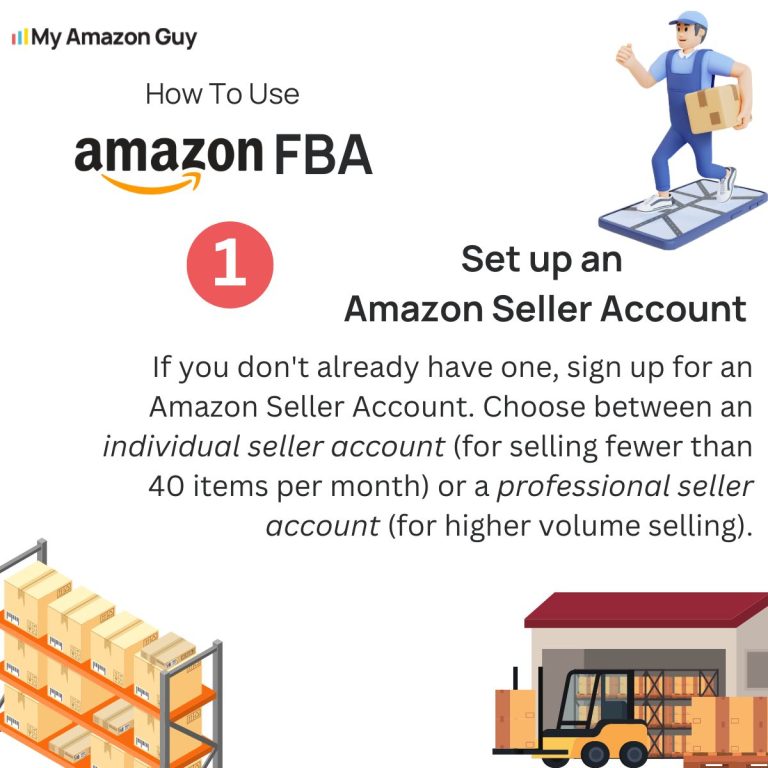
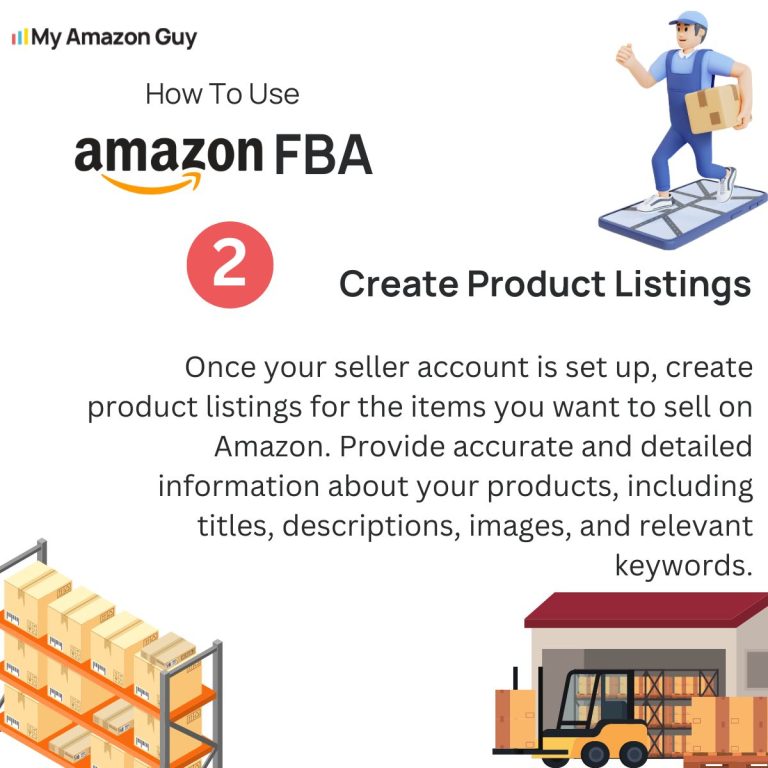
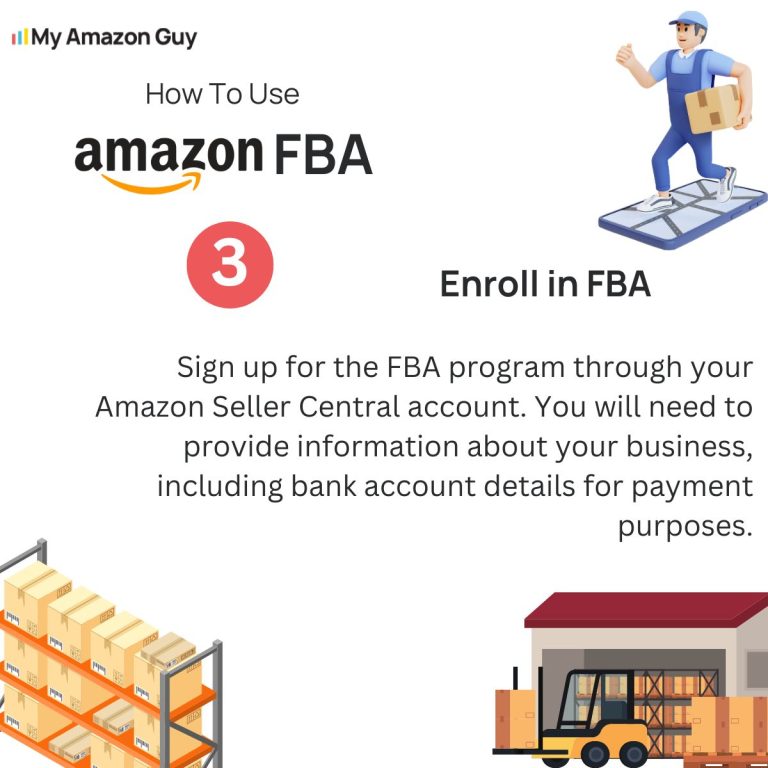
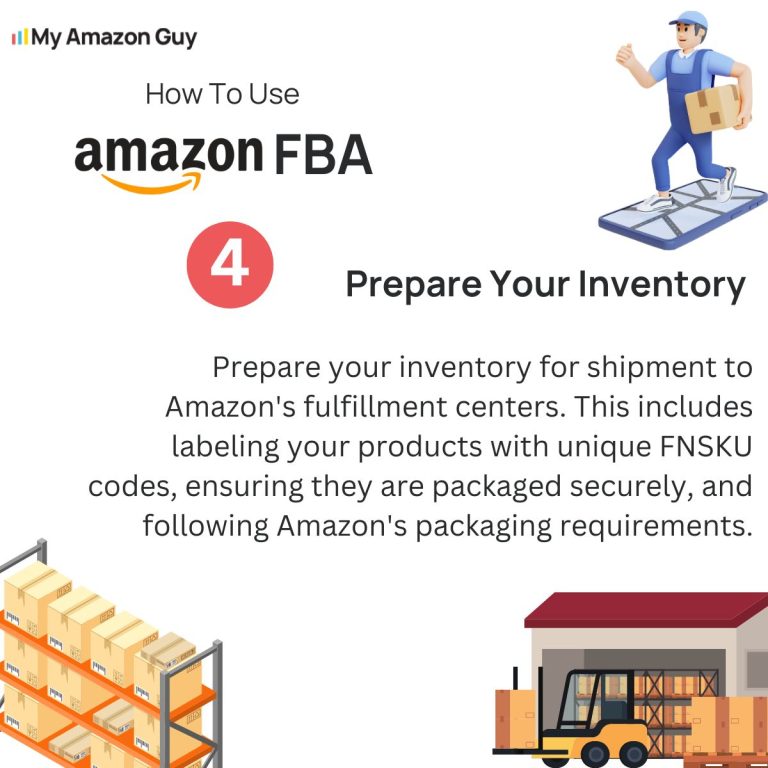
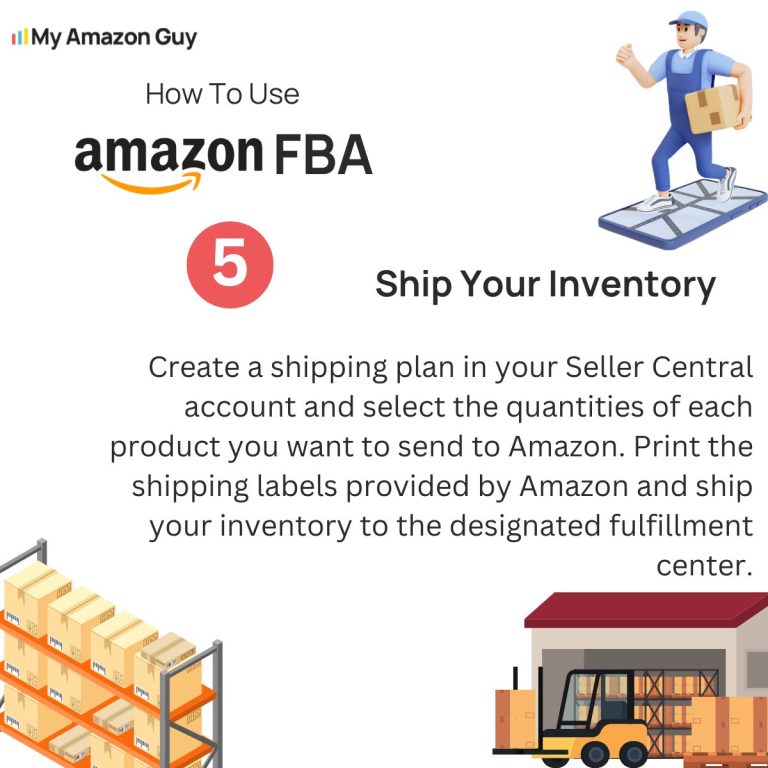
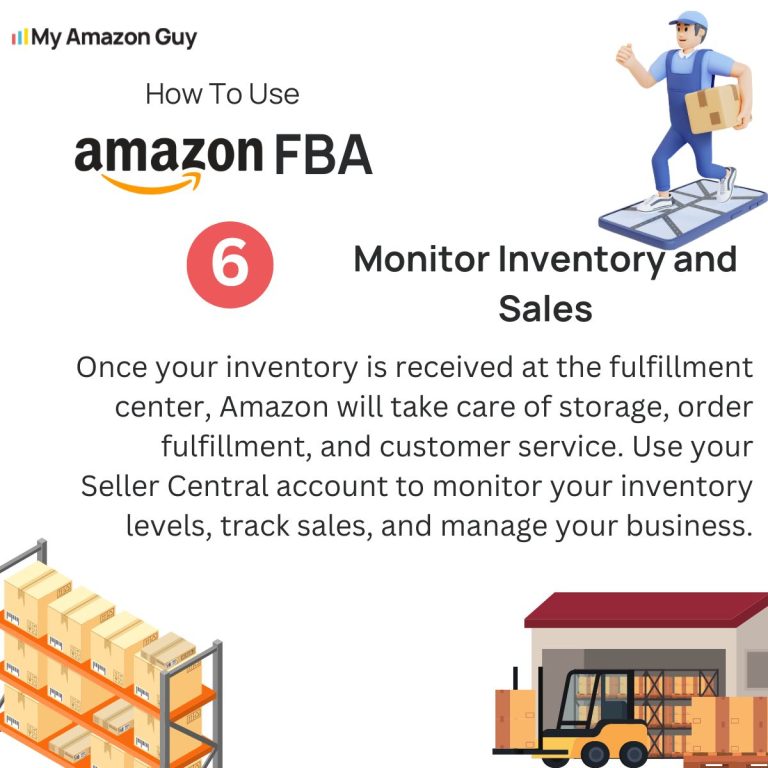
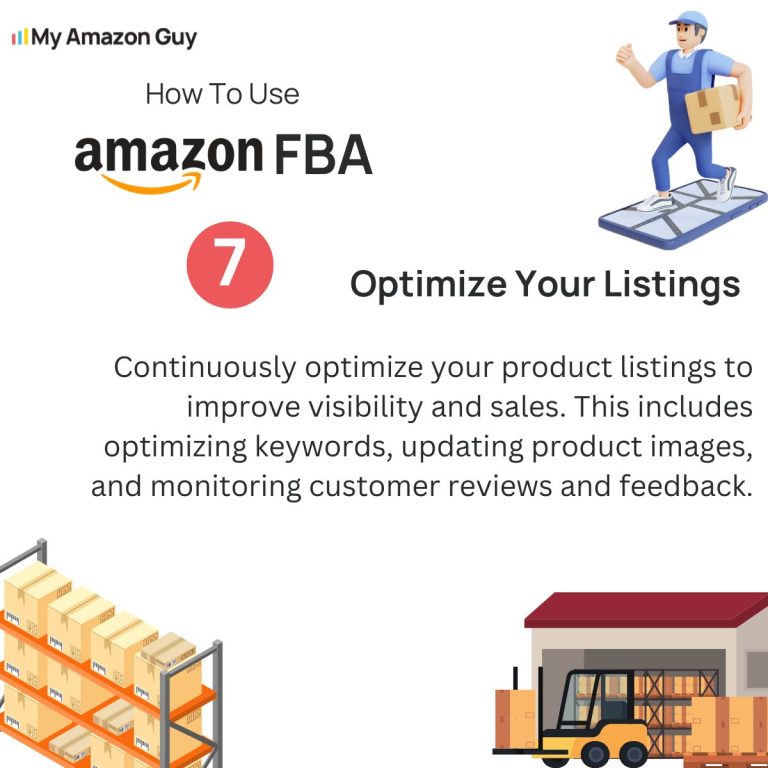
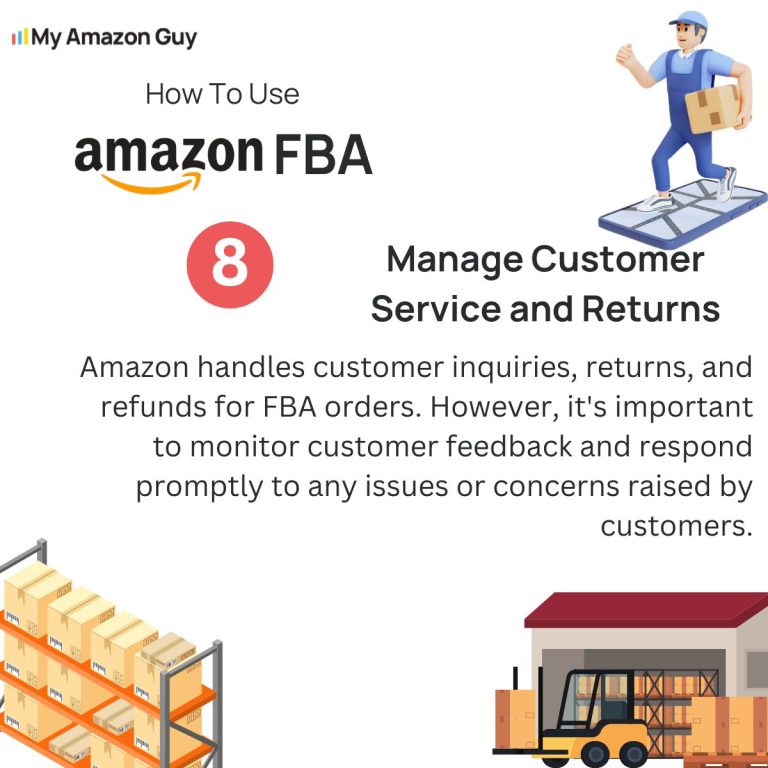
Amazon FBA Selling FAQs: Can I Sell on Amazon If I Am Not a Business?
To answer one of the not too common Amazon selling FAQs, Amazon allows individuals to sell their products through an Individual Seller Account, suitable for those selling fewer than 40 items per month.
This account allows listing, setting prices, and fulfilling orders directly. However, Individual Sellers do not have access to certain features or benefits. For higher-volume sellers, registering as a business and upgrading to a Professional Seller Account requires a monthly subscription fee.
It is crucial to comply with Amazon’s policies, guidelines, and requirements, including accurately representing products, providing excellent customer service, and adhering to shipping, returns, and feedback policies.
Exploring the options for individual sellers on Amazon
As an individual seller on Amazon, you have a few options to consider:
- Individual Seller Account: This is the basic account type for individuals who plan to sell fewer than 40 items per month. With this account, you can list products, set prices, and fulfill orders directly. However, certain features and benefits, such as creating new product listings in certain categories or participating in Amazon’s advertising programs, may not be available.
- Fulfillment by Amazon (FBA): Even as an individual seller, you have the option to use Amazon’s FBA service. This means you can send your inventory to Amazon’s fulfillment centers, and they will handle storage, packing, shipping, and customer service for your products. FBA offers benefits like faster shipping and access to Amazon Prime customers.
- Amazon Handmade: If you sell handmade products, you can consider joining Amazon Handmade. This platform allows artisans to showcase and sell their unique, handcrafted items to a wide customer base.
- Amazon Associates: If you’re not looking to sell physical products, you can explore the Amazon Associates program. This allows you to earn commissions by promoting and referring customers to Amazon products through personalized affiliate links.
Compliance requirements for selling on Amazon as an individual
When selling on Amazon as an individual, there are certain compliance requirements you need to adhere to. Here are some key considerations:
- Product Authenticity: You must ensure that the products you sell are genuine and authentic. Selling counterfeit or unauthorized goods is strictly prohibited.
- Product Condition: Accurately represent the condition of your products in your listings. Clearly disclose any flaws, damages, or imperfections.
- Product Safety: Comply with all applicable safety standards and regulations for the products you sell. Ensure that your products are safe for use and meet the necessary certifications, if applicable.
- Restricted Products: Be aware of Amazon’s restricted product categories and make sure you do not attempt to sell prohibited items. Certain products such as weapons, drugs, hazardous materials, or copyrighted materials may be restricted or require special approval.
- Intellectual Property: Respect intellectual property rights and do not infringe on trademarks, copyrights, or patents. Make sure your product listings and images do not violate any intellectual property rights.
- Customer Service: Provide excellent customer service and promptly respond to customer inquiries, feedback, and complaints. Aim to resolve any issues or disputes in a timely and professional manner.
- Shipping and Delivery: Adhere to Amazon’s shipping and delivery policies. Meet the specified shipping and delivery timelines and provide accurate tracking information to customers.
- Returns and Refunds: Follow Amazon’s policies regarding returns and refunds. Provide clear instructions and processes for customers to return items and issue refunds when necessary.
- Seller Performance Metrics: Maintain a good seller performance record by meeting Amazon’s performance metrics, including order defect rate, pre-fulfillment cancel rate, and late shipment rate.
- Data Protection: Safeguard customer data and comply with applicable data protection laws. Protect customer information and use it only for the purposes intended.
Amazon FBA Selling FAQs: Professional vs Individual Seller Accounts
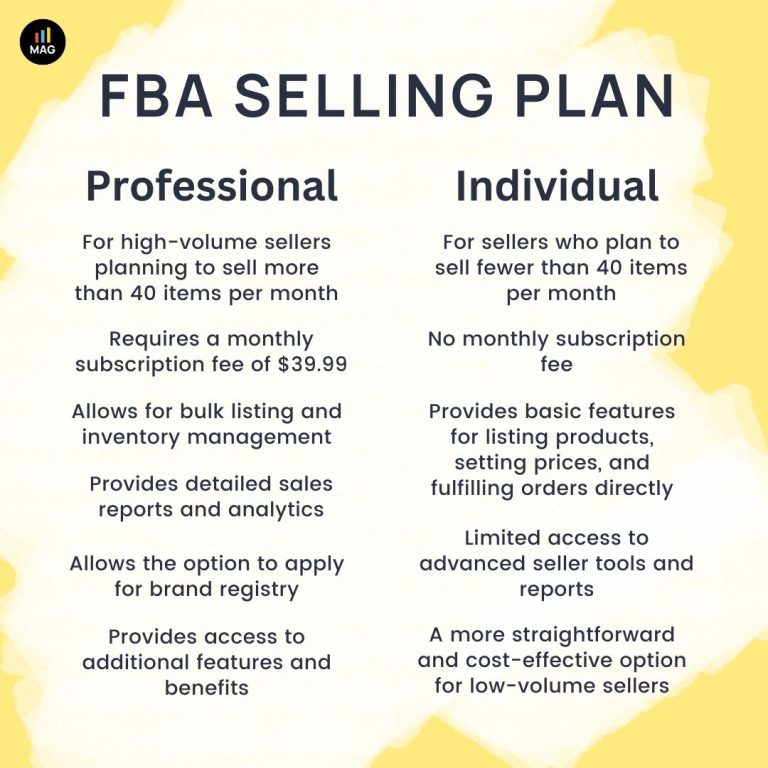
Amazon FBA Selling FBAs: Can Anyone Use Amazon FBA?
Understanding eligibility criteria for using Amazon FBA
There are no specific eligibility criteria that you need to meet. Amazon FBA is available to both individual sellers and registered businesses. However, there are some general requirements and considerations to keep in mind:
- Selling Account: You need to have a valid Amazon seller account. You can either have an Individual Seller Account or a Professional Seller Account. The Individual Seller Account is suitable for those who plan to sell fewer than 40 items per month, while the Professional Seller Account is for high-volume sellers.
- Product Categories: Certain product categories may have additional requirements or restrictions. It’s important to review Amazon’s guidelines and policies for the specific categories you plan to sell in.
- Product Condition: Your products must meet Amazon’s guidelines for product condition. It’s important to accurately represent the condition of your products in your listings and ensure that they are in compliance with Amazon’s requirements.
- Product Compliance: Ensure that your products comply with any applicable safety standards and regulations. This may include obtaining necessary certifications or adhering to specific guidelines for certain product types.
- Intellectual Property: Respect intellectual property rights and avoid selling counterfeit or unauthorized items. Make sure your product listings and images do not infringe on any trademarks, copyrights, or patents.
- Shipping and Packaging: Follow Amazon’s guidelines for shipping and packaging your products. This includes using appropriate packaging materials and labeling your shipments correctly.
Addressing any limitations or restrictions for certain sellers
- Restricted Categories: Some product categories on Amazon may have additional requirements or restrictions. For example, certain categories like jewelry, beauty, or electronics may require sellers to meet specific criteria or obtain approval before selling in those categories.
- Brand Restrictions: Certain brands may have policies that restrict third-party sellers from selling their products on Amazon. This could be due to brand exclusivity agreements or other considerations. Sellers need to ensure they have the necessary authorization or permission to sell specific brands.
- Geographic Restrictions: Amazon has different marketplaces across the world, and sellers may face restrictions on selling in certain countries or regions. This could be due to legal or logistical considerations.
- Account Performance: Amazon monitors seller performance metrics to maintain a high level of customer satisfaction. If a seller consistently fails to meet performance standards, they may face limitations or restrictions on their account, such as selling limits or account suspension.
- Intellectual Property: Sellers must respect intellectual property rights and avoid selling counterfeit or unauthorized items. If a seller is found to be infringing on trademarks, copyrights, or patents, they may face restrictions or penalties.
Amazon FBA Selling FAQs: What’s the Difference between FBA and Sold by Amazon
The distinction between FBA (Fulfillment by Amazon) and products sold directly by Amazon lies in the ownership and fulfillment of the products.
- FBA: When a seller uses FBA, they store their inventory in Amazon’s fulfillment centers. Once an order is placed by a customer, Amazon takes care of the picking, packing, and shipping of the product.
The seller remains responsible for product sourcing, pricing, and managing their listings. The product is labeled as “Fulfilled by Amazon” and benefits from Amazon’s customer service, returns, and Prime shipping options.
- Products Sold Directly by Amazon: These are products that are owned and sold directly by Amazon as the retailer. Amazon purchases inventory from manufacturers or distributors and sells it under their own brand or as a third-party seller.
Amazon handles the entire fulfillment process, including inventory management, order processing, and shipping. These products are labeled as “Sold by Amazon” or “Ships from and sold by Amazon.”
The key difference is that with FBA, the product ownership and responsibility for fulfillment remain with the individual seller or business, while with products sold directly by Amazon, Amazon itself is the seller and handles the entire process.
Amazon FBA Selling FAQs: Can I Sell One Item on Amazon?
You can sell a single item on Amazon. Whether you have just one item or multiple products, you can create a listing for that specific item and sell it on Amazon’s marketplace. Amazon provides a platform for both individual sellers and businesses to list and sell their products, regardless of the quantity.
When creating a listing for a single item, you will need to provide accurate product information, including the item’s condition, description, and images. You will also need to set a price and determine your shipping options.
Here are some videos from My Amazon Guy’s YouTube Channel that can show you how to create an Amazon listing.
It’s worth noting that while there is no limit to the number of products you can sell on Amazon, if you plan to sell a large quantity or have ongoing inventory, you may want to consider using Amazon FBA to streamline the fulfillment process. With FBA, Amazon will handle the storage, packing, and shipping of your products, allowing you to focus on other aspects of your business.
Whether you have one item or multiple, selling on Amazon can provide access to a large customer base and various selling opportunities.
Tips for success when selling only one product
- Product Research: Conduct thorough product research to ensure there is demand for your product. Look for a unique selling proposition or differentiating factor that sets your product apart from competitors.
- Listing Optimization: Create a compelling and informative product listing. Use high-quality images, write a detailed and engaging product description, and include relevant keywords to improve visibility and conversion rates.
- Competitive Pricing: Research the pricing of similar products and set a competitive and attractive price for your single item. Consider factors such as production costs, fees, and profit margins when determining the optimal price point.
- Marketing and Promotion: Implement marketing strategies to drive traffic and sales to your product listing. Utilize Amazon advertising options, social media marketing, influencer collaborations, and other promotional tactics to increase visibility and reach.
- Customer Satisfaction: Provide exceptional customer service to build trust and positive reviews. Respond promptly to customer inquiries, address any issues or concerns, and strive for a seamless buying experience.
- Product Quality and Packaging: Ensure that your single product is of high quality and meets customer expectations. Pay attention to packaging and presentation to create a positive unboxing experience for customers.
- Fulfillment Method: Choose the most suitable fulfillment method for your single product. Whether you decide to handle fulfillment yourself or opt for Amazon FBA, ensure that you have a reliable and efficient system in place to fulfill orders promptly.
- Continuous Improvement: Regularly analyze your sales data, customer feedback, and market trends. Adapt your strategy and make improvements based on the insights you gather to stay competitive and drive growth.
Remember that selling only one product can have its challenges, but with careful planning, effective marketing efforts, and a focus on customer satisfaction, you can increase your chances of success on Amazon.
Conclusion
In the fast-paced and ever-evolving world of Amazon selling, knowledge is the ultimate key to success. By familiarizing yourself with Amazon FBA Selling FAQs on getting started, you lay a solid foundation for your business to flourish. Armed with valuable insights, you can confidently navigate the process of creating an Amazon seller account, enrolling in FBA, and setting up your business. Avoiding common pitfalls and making informed decisions become second nature, empowering you to seize opportunities and grow your venture.
At My Amazon Guy, we believe that education is the pathway to success, and that’s why we’ve provided a series of comprehensive guides. Tune in for another edition of Amazon FBA Selling FAQs that can help pave your way to success.
Bonus: Signs That FBA Is Right For You











![Tackling The Golden Amazon FBA Selling FAQs To Get Your Business Started 12 Amazon Listing Optimization [Master Class] Why the Top Sellers Need to Optimize More](https://img.youtube.com/vi/b4okSNx5yLs/maxresdefault.jpg)



